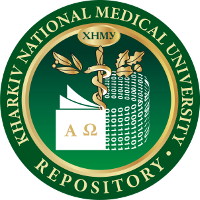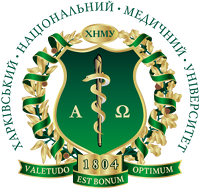Please use this identifier to cite or link to this item:
http://repo.knmu.edu.ua/handle/123456789/9260Full metadata record
| DC Field | Value | Language |
|---|---|---|
| dc.contributor.author | Kompaniiets, Kira | - |
| dc.contributor.author | Kovalyova, Olga | - |
| dc.contributor.author | Raliat, Balogun Ahmed | - |
| dc.date.accessioned | 2015-06-03T08:53:01Z | - |
| dc.date.available | 2015-06-03T08:53:01Z | - |
| dc.date.issued | 2015-03-31 | - |
| dc.identifier.citation | Raliat B. A. Basis of bioethics and biosafety. Bioethical issues of artificial insemination / B. A. Raliat, K. Kompaniiets, O. Kovalyova // Implementation of bioethics principles in clinical practice : IV International Scientific student's conference dedicated to the 210th anniversary of Kharkiv National Mеdical University, Kharkiv, 31th of March 2015 : abstract book. – Kharkiv, 2015. – P. 11. | uk_UA |
| dc.identifier.uri | https://repo.knmu.edu.ua/handle/123456789/9260 | - |
| dc.description.abstract | Ahmed Raliat Balogun, Kira Kompaniiets, Olga Kovalyova Basis of bioethics and biosafety. Bioethical issues of artificial insemination Artificial insemination (AI) is the deliberate introduction of sperm into a female's uterus or cervix for the purpose of achieving pregnancy through in vivo fertilization by means other than sexual intercourse. AI carries the associated risk of multiple gestation pregnancies, since before the procedure women are given drugs that induce ovulation. This also leads to the possibility of a superovulation. It can be very helpful for certain patients. However, ethical concerns have been raised both about the inherent nature of certain techniques and the specific contexts in which many techniques are used. AI is unique among medical procedures because they aim specifically to create new individuals and family relationships. The ethics of AI must be understood within this social context, which is often characterized by tension among competing interests. Although most infertility treatments are sought by a woman and man in a close relationship, as many as 5 adults may play parenting roles in AI the genetic mother and father (ovum and sperm providers), the gestational mother and the intended social parents. Each party has his or her own interests and vulnerabilities. Any offspring who result are the most vulnerable of all, since they could not consent to the arrangements that will profoundly shape their developing identities. The interests of potential offspring must therefore always be central to reproductive choices. Informed consent requires full disclosure and fair representation of all potential medical, social and emotional outcomes and risks. Unfortunately, we often lack sufficient information to provide the full disclosure needed for truly informed choice. Supportive counselling can assist patients to make these profoundly meaningful life choices and to prepare realistically for suboptimal outcomes such as medical complications, multiple births, pregnancy loss and having no pregnancy at all. As in all areas of medicine, invasive or potentially dangerous treatments must be reserved until options with less risk have been exhausted. Contributors to infertility, including alcohol, medications, diet, stress, occupational exposure and other lifestyle factors should be addressed in both partners. Underlying health issues that contribute to infertility should be investigated and treated. | uk_UA |
| dc.language.iso | en | uk_UA |
| dc.subject | artificial insemination | uk_UA |
| dc.subject | bioethics | uk_UA |
| dc.subject | biosafety | uk_UA |
| dc.title | Basis of bioethics and biosafety. Bioethical issues of artificial insemination | uk_UA |
| dc.type | Thesis | uk_UA |
| Appears in Collections: | Наукові роботи молодих вчених. Кафедра пропедевтики внутрішньої медицини № 1, основ біоетики та біобезпеки | |
Files in This Item:
| File | Description | Size | Format | |
|---|---|---|---|---|
| тезисы компаниец).docx | 15,03 kB | Microsoft Word XML | View/Open |
Items in DSpace are protected by copyright, with all rights reserved, unless otherwise indicated.

